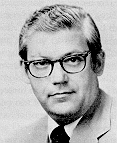James Bruce Cardwell
 |
JAMES BRUCE CARDWELL James Bruce Cardwell served as Commissioner of Social Security from 1973 until 1977. He is currently Executive Vice President of the Blue Cross and Blue Shield Associations.
|
I have always thought of the Social Security program and the people who administer it as being one and the same. Without one we couldn't have the other. And I am especially proud to have been a part of both, if but for only 4 short years. For almost 20 years prior to joining Social Security, from my vantage point in the Department of Health, Education, and Welfare, I worked alongside Bob Ball, Art Hess, Jack Futterman, Millie Tyssowski, and many others who shall long be remembered for their service to SSA and its cause. The quality of their work, their pride in it and their loyalty to their agency and its purpose were extraordinary. There was no question in my mind or in the mind of anyone who understood the Federal service but that SSA was the very best Federal agency, not just within the Department of Health, Education, and Welfare, but within all of government. It was with these feelings of respect and admiration for the agency and its employees that I joined SSA in 1973. And, while there, these feelings were reinforced and confirmed. I saw the same spirit, dedication and pride that I had observed before make SSI work in the 1970's--just as they had made Medicare work in the 1960's and just as they have made the basic Social Security program work for 50 years. Today, I live away from Washington and Baltimore and my time and attention are spent on things unrelated to government. But, I think often about what might be happening to it. I think particularly about what might be happening to the institutional strength and capacities of SSA and the esprit of its employees. I'm fearful that they may have been weakened or eroded by the mood and events of the last decade. But, at the same time, I reassure myself through my belief that the things that have always set SSA apart will see it through once again. This is important to all who care about the quality of government and the interests of those whom it serves. My other thoughts of the moment go to how today's younger workers feel about the program and its future. Because of the protracted controversy over the program's financial adequacy, too often young people appear doubtful about whether it will be there when they need it or whether they will get their money's worth. I see these concerns and questions as being the most critical challenge currently facing the program. They must be overcome and full public confidence must be restored. To this end, nothing should be taken for granted when it comes to public perception and understanding. Every worker, every citizen must be made to understand that Social Security is financially sound; that it can and will do what is expected when the time comes, whether that time be tomorrow or another 50 years from now. |
|